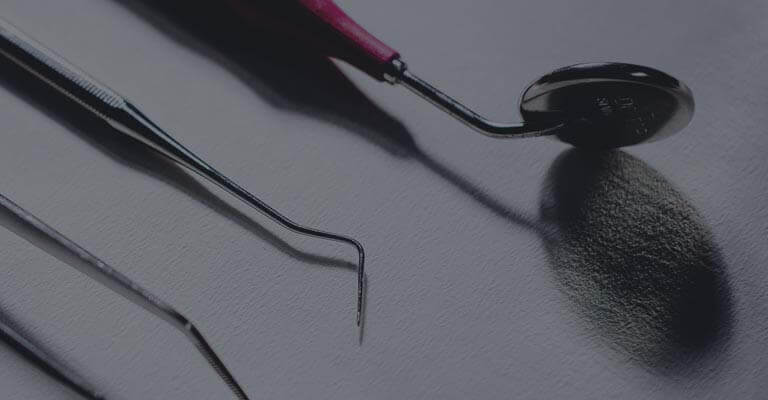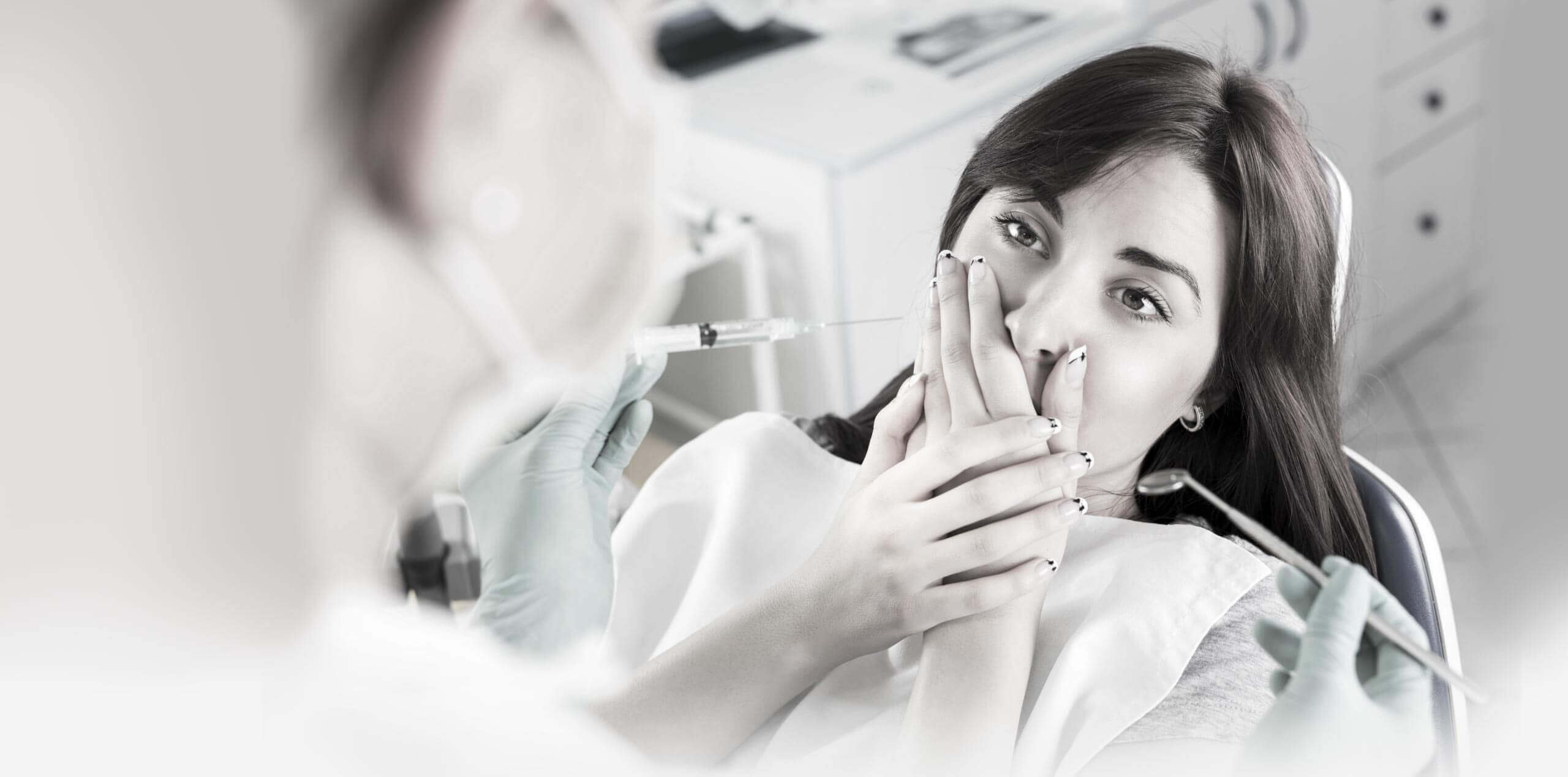

Advice for Patients with a Dental Phobia & Anxiety


Human Beings Are as Unique as Their Worries
This also counts for people’s individual desires. The headsurgeon and authorized dentist Prof. Schermer at BERLIN-KLINIK International Hospital works with dental phobia, fear of high risk diagnosis and overstressed and dissapointed patients since 15 years now. Let us discuss your worries and wishes together so we can find the solution that suits you. Rest assured that you will not be distressed! Insecurity, pain, and fear become things of the past. Dental phobia can have many causes; many patients avoid seeing a dentist because of former traumatic or negative experiences. You should try to overcome these feelings and no longer push these pressing issues aside! Modern methods make things much easier than they used to be. BERLIN-KLINIK International Hospitals specialised dentists will carefully listen you and offer you the best possible proven, secure and absolute stress free Solutions in Germany and Europe!
Individual problems require individual solutions – and the possibilities are manifold. Dental phobia and non-treatment because of high-risks should become themes of the past. BERLIN-KLINIK International Dental Clinic high specialised medical team is educated and equipped to offer you a individual minimal invasive total rehabilitation under full anaesthesia. Inpatient ans well as outpatient treatments are possible.
You Can Find Phobic and High-Risk Patient Treatment Topics Under:
We dentists experience that other people do not like our craftsmanship as much as we do. Even more the dental surgeon! Some people don’t look forward to dental appointments any more than they look forward to visits to a physician. Most dental procedures aren’t painful. However, just being examined can make people feel uncomfortable to stressed. Most people can live with having some anxiety about going to the dentist. For those with dental phobia, however, the thought of a dental visit is terrifying. They may be so frightened, in fact, that they’ll do just about anything to avoid a dental appointment. We know that and from the construction of BERLIN-KLINIK on we tried to avoid a typical dental environment. It starts with colours..furniture..and ends up that in BERLIN-KLINIK you will not take place in a dentists chair but in a comfortable chesterfield. No one will examine you with metal instruments and compressed air. In BERLIN-KLINIK, we will examine you the most comfortable and privacy-respecting way possible…we will together sit down and speak about a printed digital x-ray of your teeth and jaws.
Dental phobia
A phobia is an intense, unreasonable fear. People can fear a specific activity, object or situation. People with dental phobia often put off routine care for years or even decades. To avoid it, they’ll put up with gum infections, periodontal diseases, pain, or even broken and unsightly teeth. Dental anxiety and dental phobia are extremely common. It has been estimated that 9% to 15% of people avoid seeing the dentist because of anxiety and fear. People often use the words dental “anxiety” and dental “phobia” to mean the same thing, but they are different.
Dental anxiety
Those with dental anxiety will have a sense of uneasiness when it’s time for their appointments. They’ll have exaggerated or unfounded worries or fears. Dental phobia is a more serious condition. It’s an intense fear or dread. People with dental phobia aren’t merely anxious. They are terrified or panic-stricken. People with dental phobia have a higher risk of gum disease and early tooth loss. Avoiding the dentist may have emotional costs as well. Discoloured or damaged teeth can make people self-conscious and insecure. They may smile less or keep their mouths partly closed when they speak. Some people can become so embarrassed about how their teeth look that their personal and professional lives begin to suffer. There is often a serious loss of self-esteem. In a dental maximum treatment facility like BERLIN-KLINIK we found out that people with dental phobia also may suffer from poorer health in general, and even lower life expectancy. This is because poor oral health has been found to be related to some life-threatening conditions, such as heart disease and lung infections.
Solutions for people with a dental phobia include general anaesthesia.
Your first appointment will be a personal consultation held in a room with no dental instruments at all. You can tell us about your fears and experiences; we will propose possible solutions. This preliminary meeting does not imply treatment. It is without commitment and enables us to get to know each other. Only then, and only if you desire, will we make a second appointment for an examination. All inpatient and outpatient treatments can be done in full anaesthesia. We are specialised on such total anaesthesia dental rehabilitations and we will fulfill your needs safe and efficient.
You visit BERLIN-KLINIK as a patient – and the word patient is derived from the Latin word “patior” – meaning: “to suffer”! To take this initial step can be hard and charged with unpleasant thoughts and memories. Fear can cause pain and vice versa. We will listen to you and be sure that…using disturbing and painful dental instruments is no longer indispensable for dental examination. Thanks to modern, low-radiation 2D and 3D diagnostics we can examine your mouth without getting too close to you. Based on the information obtained we will then discuss how to proceed. Extensive treatments can be carried out under general anaesthetic which is a good option and can be a crucial aspect for phobic patients who can be treated pain- and stress-free. Many treatments of dental phobic patients, which can be rather time-consuming due to the phobia, are thus made easier and can frequently be completed within only a few or even a single session. After a check-up to monitor the success of the treatment you can either be discharged or rest in the recovery area of our practice under our supervision and care.
There are varying degrees of dental anxiety, dental fear and phobia. At the extreme, a person with dental phobia may never see a dentist. Others may force themselves to go, but they may not sleep the night before. It’s not uncommon for people to feel sick or, in some cases, to actually get sick while they’re in the waiting room. Dental phobia, like other mental disorders, can be treated. BERLIN-KLINIK offers several proven and secure treatment options. Without treatment, dental phobia is likely to get worse over time. That’s partly because emotional stress can make dental visits more uncomfortable than they need to be. People who are unusually tense tend to have a lower pain threshold. This means they may feel pain at lower levels than other people. People with dental anxiety may need extra anesthetic or other pain treatments. They may even develop stress-related problems in other parts of the body. For example, they may have headaches or muscle stiffness in the neck or back.
People develop dental fears and turn to general anaesthesia for many reasons. When we interview patients in BERLIN-KLINIK, however, a few common themes emerge. At first: pain: In a survey of people who had not seen a dentist for 12 months, 6% reported fear of pain as the main reason. The fear of pain is most common in adults 24 years and older. This may be because their early dental visits happened before many of the advances in “pain-free” dentistry like we offer them since years. Second place the feelings of helplessness and loss of control. Many people develop phobias about situations, such as flying in an airplane, in which they feel they have no control. When they’re in the dental chair, they have to stay still. They may feel they can’t see what’s going on or predict what’s going to hurt. It’s common for people to feel helpless and out of control, which may trigger anxiety. And last not least: Embarrassment: The mouth is an intimate part of the body. People may feel ashamed or embarrassed to have a stranger looking inside. This may be a particular problem if they’re self-conscious about how their teeth look. Dental treatments also require physical closeness. During a treatment, the hygienist’s or dentist’s face may be just a few inches away. This can make people anxious and uncomfortable. And additionally negative past experiences. Anyone who has had pain or discomfort during previous dental procedures is likely to be more anxious the next time around.
There isn’t a clear boundary that separates normal anxiety from phobia. Everyone has fears and concerns and copes with them in different ways. However, the prospect of dental work, especially in BERLIN-KLINIK does not need to fill you with terror. If it does, then you may need some help overcoming the fears. Some of the signs of dental phobia include: You feel tense or have trouble sleeping the night before a dental exam. You get increasingly nervous while you’re in the waiting room. You feel like crying when you think of going to the dentist. The sight of dental instruments, or of white-coated personnel in the dentist’s office, increases your dental fear. The thought of a dental visit makes you feel physically ill. You panic or have trouble breathing when objects are placed in your mouth during a dental appointment. If this describes you, you need to tell us about your feelings, concerns and fears. We will help you overcome these feelings by changing the way you are treated. BERLIN-KLINIK will show you new ways to get rid of dental problems! You also may be referred to a mental health professional.
In agreement with your attending physician, internal specialist, or medical specialist, BERLIN-KLINIK International Hospital will customise treatment to your needs. Our high in rank specialised doctors will carefully listen to you and examine what is necessary or helpful. If needed or wanted we start with a full Body cardiologic checkup and go on with wide spread computerized and robotic assisted laboratory diagnostics. Minimal invasive, high-tech equipped and focused on your best possible outcome. This will take a little more time and thus also more patience on your part. We will carefully plan everything for the sake of your well-being and your safety. If necessary, an anaesthetist or an emergency physician will be present throughout treatment. Professor Schermer will care for you himself and guarantees that only Prfessors, Senior lecturers and chief physicians will examine you and cooperate together for your best possible outcome.
